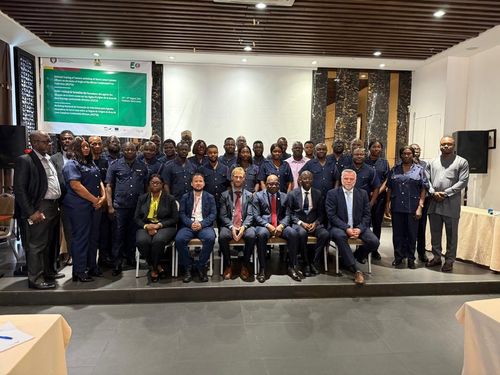August 29, 2025
Atlantic Lumley Hotel, Freetown
The Economic Community of West African States (ECOWAS) and GIZ have concluded a three-day National Training of an Trainers workshop to empower Customs Officers at Sierra Leone’s National Revenue Authority on the African Continental Free Trade Area (AfCFTA) Rules of Origin. This initiative aims to equip customs officials with the skills needed to enforce AfCFTA trade protocols and enhance transparency, marking a key step in strengthening the capacity of customs personnel to support Africa’s largest free trade agreement.
During the opening session, keynote speeches were delivered by several dignitaries including Gerald H.P. Ganda, Deputy Commissioner General 2 of NRA, ECOWAS Resident Representative H.E. John Azumah, GIZ Country Director Raphael Frerking, the European Union Delegation’s Holger Rommen, and Johannes Behrenhs. Gerald H.P. Ganda NRA DCG2 emphasized the critical role of Rules of Origin in global trade, explaining how they determine the economic nationality of products and ensure fair application of trade agreements, including tariff reductions and exemptions. He ended by thanking ECOWAS and GIZ for their continued support to the NRA.
H.E. Ambassador Azumah congratulated President Julius Maada Bio on his appointment as Chairman of the ECOWAS Heads of State and Government and expressed confidence in his leadership to deepen regional cooperation. He highlighted ECOWAS’s strategic framework, which focuses on free movement of persons and goods, strengthening intra-community trade, and advancing regional integration as key pillars for economic development.
GIZ Country Director Raphael Frerking described AfCFTA as the foundation for an internal African common market, rooted in the Abuja Treaty and reinforced by the Kigali summit. He praised Sierra Leone’s commitment to building capacity for full implementation of the agreement, which is expected to boost trade, create jobs, and empower youth and women. The model will enable trained officers to share knowledge nationwide, improving customs efficiency, reducing fraud, and promoting transparency in cross-border trade. The training climaxed by awarding of certificates to the trainees.

